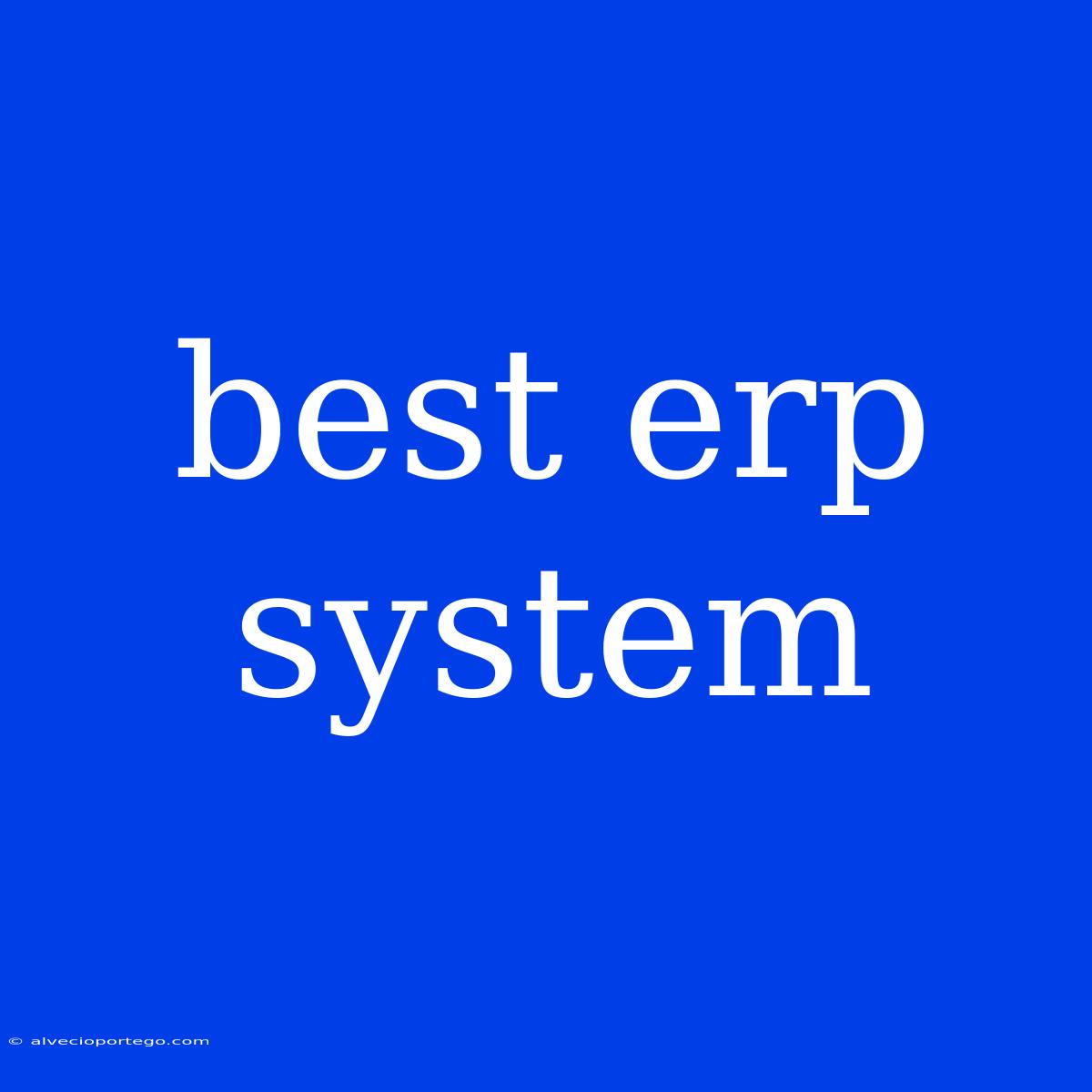Finding the Best ERP System for Your Business: A Comprehensive Guide
An Enterprise Resource Planning (ERP) system is a game-changer for businesses of all sizes. It integrates all your essential business functions into one centralized platform, improving efficiency, streamlining operations, and maximizing profitability. But with so many options available, choosing the best ERP system for your specific needs can feel overwhelming.
This guide will equip you with the knowledge to navigate the ERP landscape and make an informed decision for your business.
Understanding Your Needs
Before diving into the world of ERP systems, it's crucial to understand your business's specific requirements. Ask yourself these key questions:
- What are your primary business challenges? Are you struggling with inventory management, financial reporting, or customer relationship management?
- What are your business goals? Do you want to improve efficiency, enhance customer service, or expand into new markets?
- What are your budget constraints? ERP systems range widely in price, so you need to determine your financial limitations.
- What are your technological capabilities? Consider your IT infrastructure, employee skillset, and integration requirements.
Key Features to Consider
A robust ERP system should offer:
- Financial Management: Accounts payable, accounts receivable, budgeting, financial reporting, and forecasting.
- Human Resources: Payroll, employee benefits, talent management, and time and attendance tracking.
- Supply Chain Management: Inventory control, procurement, warehousing, and distribution.
- Customer Relationship Management (CRM): Sales, marketing, customer support, and service management.
- Manufacturing: Production planning, scheduling, quality control, and maintenance.
- Reporting and Analytics: Real-time data insights, customizable dashboards, and business intelligence tools.
- Integration Capabilities: Seamless integration with existing software systems, such as accounting, CRM, and e-commerce platforms.
- Security and Compliance: Robust security measures and compliance with industry standards.
Types of ERP Systems
ERP systems are broadly classified based on their deployment model:
- On-premise: Hosted on your own servers, offering greater control but requiring significant upfront investment.
- Cloud-based: Hosted by a third-party provider, offering scalability, flexibility, and lower costs.
- Hybrid: Combines elements of both on-premise and cloud-based deployments, offering a balance of control and flexibility.
Choosing the Right ERP System
1. Research and Shortlist:
- Identify potential vendors: Explore leading ERP providers like SAP, Oracle, Microsoft Dynamics, Infor, NetSuite, and others.
- Review their offerings: Compare features, pricing, industry expertise, and customer support.
- Read user reviews and case studies: Gain insights from real-world experiences.
- Attend industry events and webinars: Get a firsthand look at the latest technologies and solutions.
2. Demanding a Demo and Conducting a Proof of Concept (POC):
- Request demos from shortlisted vendors: Evaluate their user interface, functionality, and integration capabilities.
- Conduct a POC: Implement the software in a simulated environment to assess its effectiveness and suitability for your specific needs.
3. Evaluating and Selecting:
- Consider your long-term vision: Choose a system that can adapt to your evolving business needs.
- Prioritize scalability and flexibility: Select a system that can grow with your business.
- Factor in implementation costs and ongoing maintenance: Obtain quotes from different vendors and compare their offerings.
- Negotiate contracts and ensure clarity on service level agreements: Protect your interests and ensure ongoing support.
Implementation and Support
Once you've chosen an ERP system, a successful implementation is crucial for realizing its full potential.
- Engage experienced implementation partners: They can guide you through every stage, from planning to training.
- Involve key stakeholders: Ensure buy-in from all departments and users.
- Provide comprehensive training: Equip your team with the skills and knowledge to use the system effectively.
- Establish ongoing support and maintenance: Ensure access to technical assistance and system updates.
Conclusion
Selecting the best ERP system for your business requires careful consideration of your unique needs, goals, and budget. By following the steps outlined in this guide, you can navigate the complex world of ERP solutions and choose a system that will empower your business to thrive. Remember, the right ERP system is an investment in your business's future, so make an informed decision that sets you up for success.

